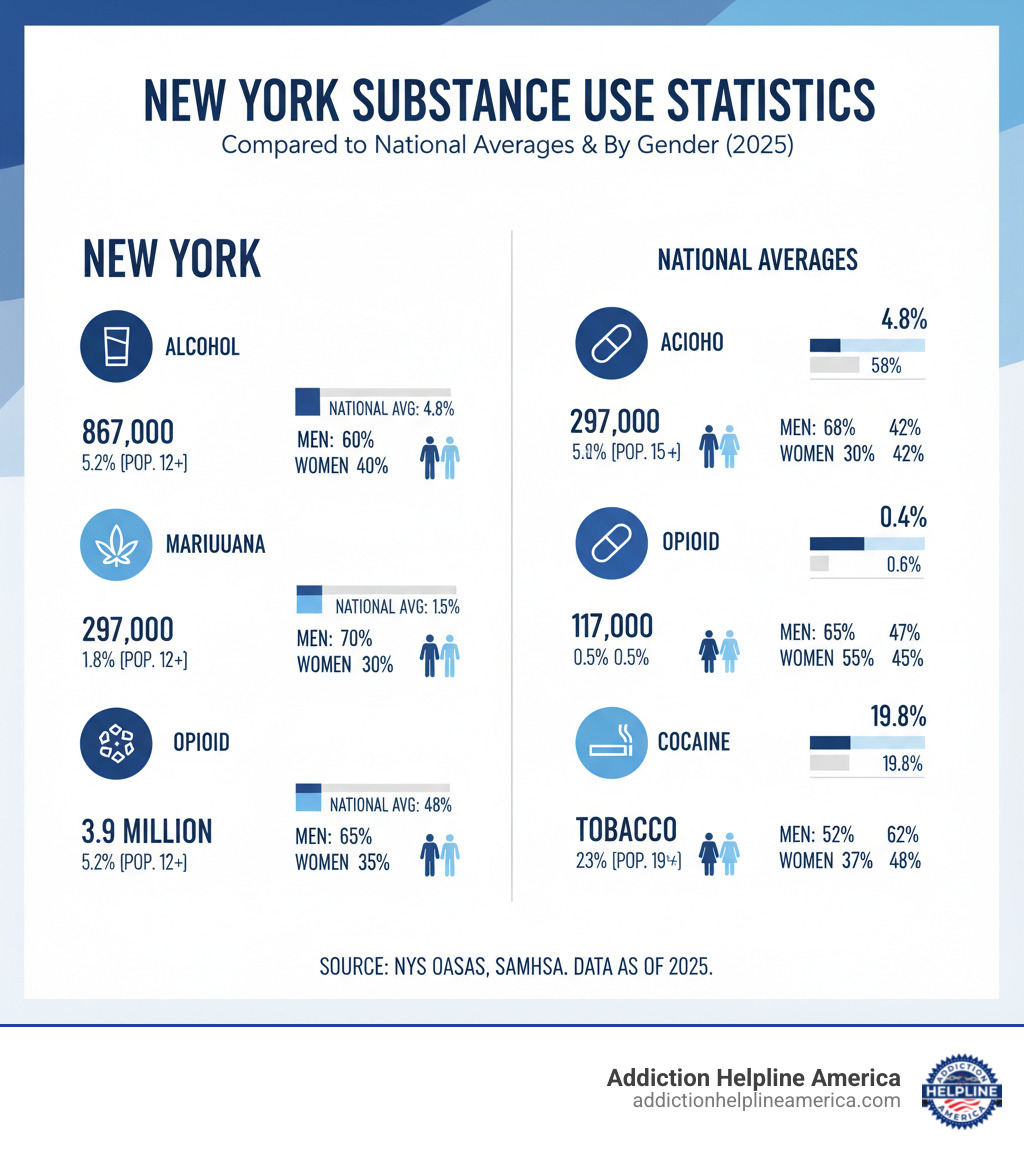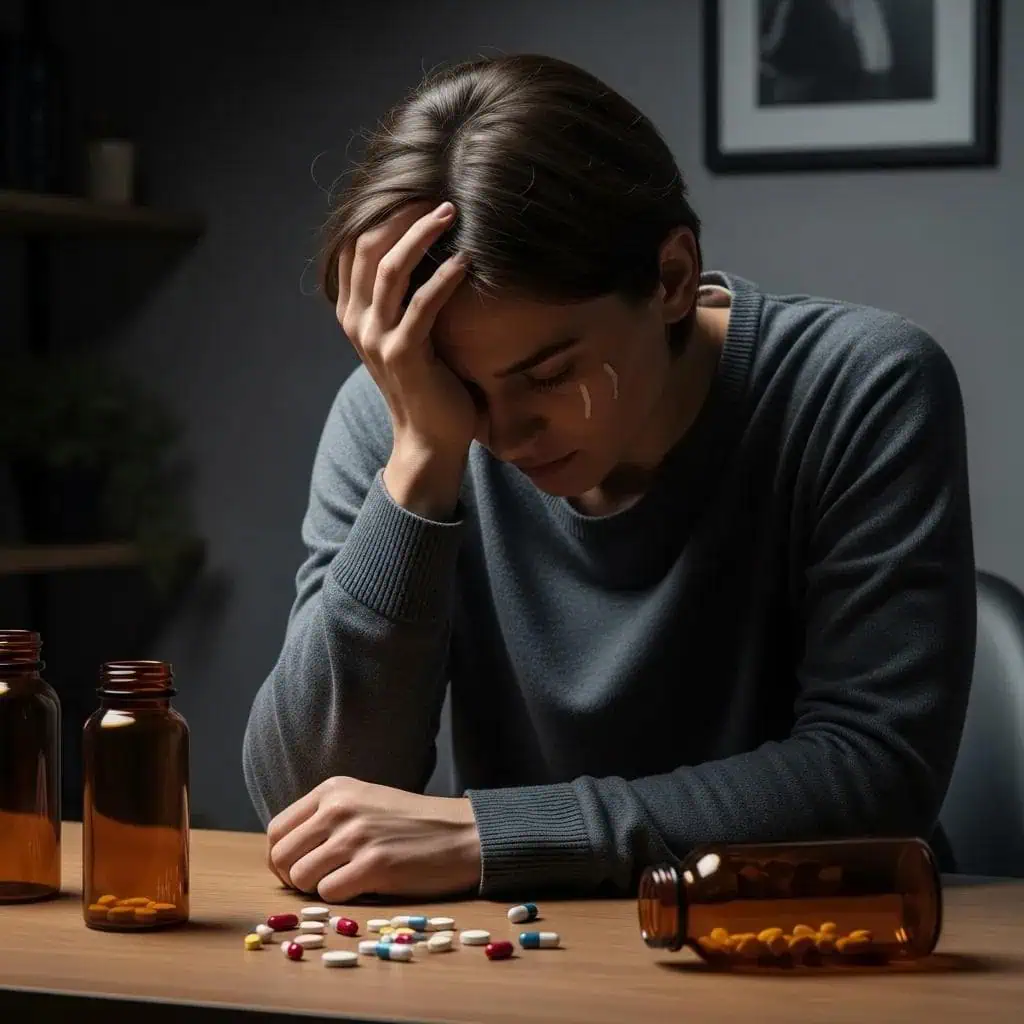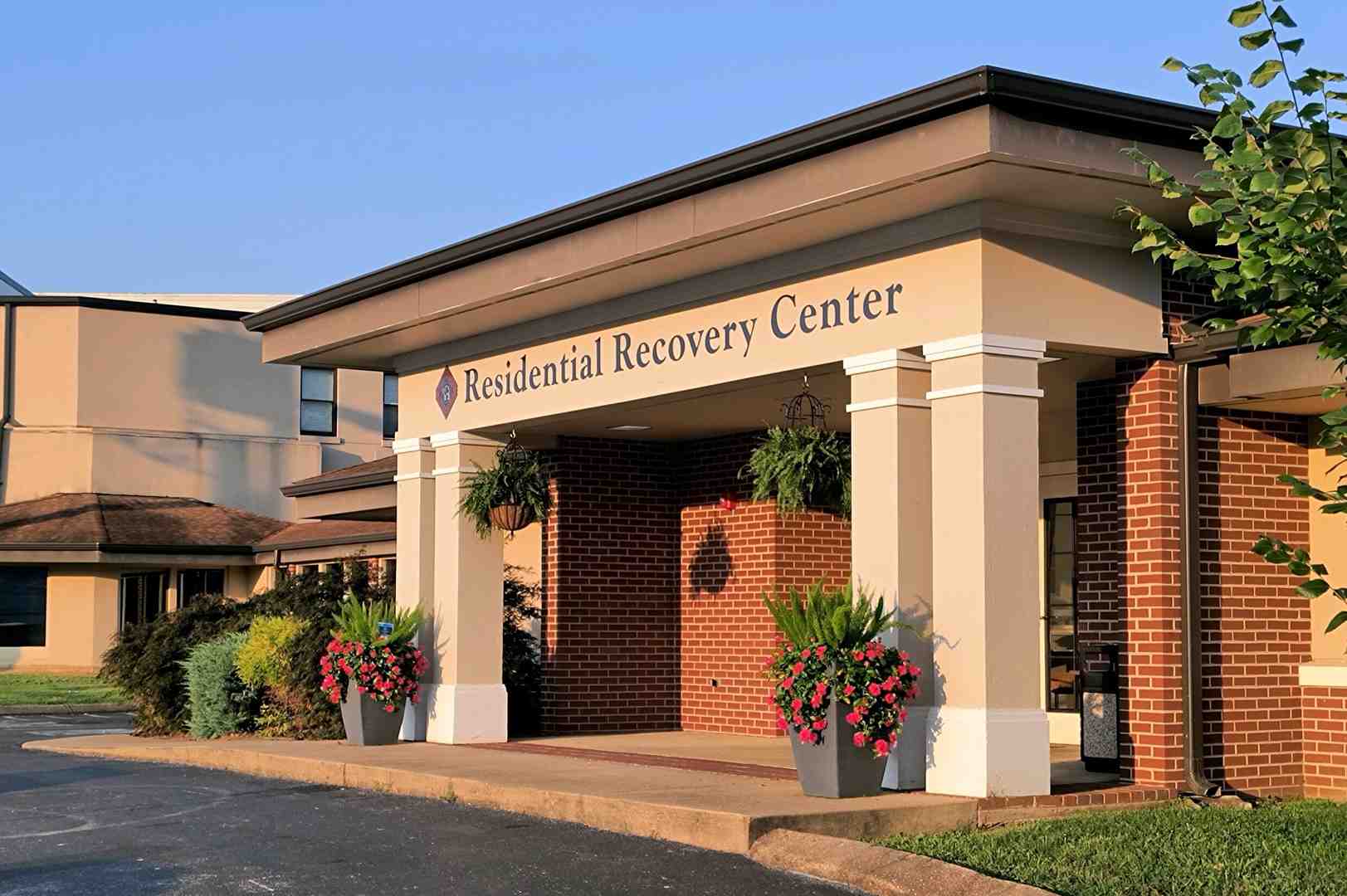
Finding Hope and Help: Why Choosing the Right Rehab Matters
Rehab centers New York offer a lifeline to those struggling with addiction. With over 1,700 addiction treatment programs statewide, from state-run facilities to private luxury centers, finding the right fit can feel overwhelming.
Quick Overview: New York Rehab Centers
- 607+ treatment facilities serve New York, including 12 state-operated Addiction Treatment Centers (ATCs).
- Treatment types: Medical detox, inpatient, partial hospitalization (PHP), intensive outpatient (IOP), standard outpatient, and aftercare.
- Average costs: $56,653 for a 30-day inpatient program; $5,000-$10,000 for outpatient care.
- Insurance: Most plans cover addiction treatment; Medicaid and Medicare are widely accepted.
- Specialized programs: Available for veterans, LGBTQ+ individuals, teens, and those with co-occurring mental health disorders.
- State oversight: All programs are certified by the Office of Addiction Services and Supports (OASAS).
New York faces significant addiction challenges, with nearly 867,000 residents struggling with alcohol addiction and 87,000 battling opioid use disorder. These numbers represent real people who deserve compassionate, evidence-based care.
The good news is that recovery is possible. New York offers comprehensive treatment options at every level, from detox and residential treatment to flexible outpatient programs. You can find accredited facilities designed to meet your specific needs.
At Addiction Helpline America, we guide individuals and families in finding rehab centers in New York that match their unique circumstances, insurance, and recovery goals. We’re here to help you steer your options with compassion and clarity.
Understanding the Landscape of Rehab Centers in New York
When searching for rehab centers New York, it’s helpful to understand that addiction treatment is a network of services, not a single path. New York offers a comprehensive landscape of care, from medical stabilization to long-term aftercare.
Different Levels of Addiction Care
Addiction treatment is a continuum of care. Most people move through several levels of intensity based on their needs.
- Detoxification: This is often the first step. It’s a medically supervised process that safely manages withdrawal symptoms using medication and monitoring to keep you comfortable.
- Inpatient or Residential Treatment: These programs provide 24/7 support in a substance-free environment. Inpatient care is often hospital-based and more clinical, while residential programs offer a home-like setting. Both typically last 30 to 90 days and focus on therapy and building coping skills.
- Partial Hospitalization Programs (PHP): A step down from inpatient care, PHPs offer intensive treatment during the day (like a full-time job) while you return home or to a sober living environment at night.
- Intensive Outpatient Programs (IOP): Offering more flexibility, IOPs typically involve several evening sessions per week, allowing you to maintain work, school, or family commitments.
- Standard Outpatient Treatment: This involves weekly therapy and support groups. It’s best for those with less severe addiction or as a step-down from more intensive care.
- Aftercare Planning: This crucial stage connects all levels of care and extends beyond formal treatment. It includes ongoing therapy, support groups like AA/NA, and relapse prevention strategies to support long-term recovery.
Accredited and Licensed Facilities
Accreditation and licensing are your assurance of a facility’s quality, safety, and ethics.
- State Oversight (OASAS): In New York, the Office of Addiction Services and Supports (OASAS) certifies over 1,700 programs, ensuring they meet state regulations. OASAS also operates 12 Addiction Treatment Centers (ATCs) that provide care to all residents, regardless of their ability to pay.
- National Accreditation: Look for accreditation from organizations like the Commission on Accreditation of Rehabilitation Facilities (CARF) or The Joint Commission. This signifies a facility’s commitment to the highest standards of care.
- Person-Centered Care: Effective programs tailor treatment plans to your unique needs, strengths, and goals rather than using a one-size-fits-all approach.
- Amenities and Cost: Facilities range from basic, clinically-focused centers to luxury retreats with private rooms and gourmet meals. State-operated and OASAS-funded facilities are more affordable and accessible, while private centers often have higher costs but offer more upscale environments. Accreditation ensures clinical quality, while amenities are a matter of preference and budget.
How to Choose the Right New York Rehab for You
Finding the right rehab center is a critical step in your recovery. It’s about finding a place where you feel safe, understood, and supported.
Start by assessing your personal needs. Consider the substances used, any co-occurring health conditions, and your work or school commitments. This will help narrow your options.
Consider the treatment philosophy. Many rehab centers New York use evidence-based therapies like cognitive behavioral therapy (CBT). Some also offer holistic approaches like yoga, meditation, or art therapy. Research on effective behavioral therapies shows that addressing multiple dimensions of wellness improves outcomes.
Location is another key factor. Decide if you’d prefer to be close to your support network in New York City or in a peaceful upstate setting away from triggers.
Look for accreditation. Facilities certified by OASAS, CARF, or The Joint Commission meet rigorous quality standards. While amenities like private rooms are nice, the quality of therapy and staff expertise are what truly matter for lasting recovery.
Finding Specialized Rehab Centers in New York
New York’s rehab network offers specialized programs for specific needs.
- Dual Diagnosis: This is vital, as about 50% of people with substance use disorders have co-occurring mental health conditions. These programs treat addiction and conditions like depression or PTSD simultaneously.
- Gender-Specific Programs: These create safe spaces for men and women to address unique issues like trauma, body image, or emotional expression.
- Veterans and First Responders: These programs offer trauma-informed care for PTSD and the specific stressors of military or emergency service.
- LGBTQ+ Affirming Care: This provides a judgment-free environment that understands the challenges faced by the LGBTQ+ community, such as discrimination and minority stress.
- Teen and Young Adult Programs: These use age-appropriate therapies and often include academic support and family involvement.
- Problem Gambling Treatment: Some facilities offer specialized services for behavioral addictions like problem gambling.
Navigating Cost and Insurance for Rehab Centers in New York
Financial concerns shouldn’t prevent you from getting help. You have options.
- Average Costs: A 30-day inpatient program in New York averages around $56,653, while outpatient care is more affordable at $5,000 to $10,000. Costs vary by care level, duration, and amenities.
- Insurance Coverage: Thanks to mental health parity laws, most health insurance plans cover addiction treatment. Many rehab centers New York accept major providers like Aetna, BlueCross BlueShield, Cigna, and United Healthcare.
- Public Options: Medicaid and Medicare provide crucial coverage. Many OASAS-certified facilities accept these, and OASAS-funded providers cannot turn you away for inability to pay.
- In-Network vs. Out-of-Network: Choosing an in-network provider significantly reduces your out-of-pocket costs.
- Need Help? Resources like the CHAMP program can help you understand your insurance rights. At Addiction Helpline America, we offer free, confidential guidance to help you verify your benefits and find the right treatment.
A Look at Top-Rated Rehab Centers in New York
When searching for rehab centers New York, remember there’s no single “best” facility—only the best one for you. To help you find the right fit, we’ve identified seven types of treatment centers, each excelling in a specific approach.
1. The Comprehensive Care Campus
These large, well-established centers offer a full continuum of care under one roof. Your journey progresses seamlessly from medical stabilization (detox) to inpatient rehabilitation and robust aftercare planning. Many also conduct integrated research, putting the latest addiction science into practice. Research on effective behavioral therapies shows that integrated, evidence-based approaches like those used here are highly effective.
2. The Urban Boutique Retreat
For those who value privacy and discretion, these centers located in NYC offer an intimate, upscale healing environment. They feature executive programs with flexible scheduling, improved privacy with smaller groups, and luxury amenities like private rooms and gourmet meals. These facilities typically cater to clients with private insurance or who self-pay.
3. The Accredited Community Treatment Center
Representing state-operated or OASAS-certified facilities, these centers are accessible to all NY residents, regardless of ability to pay. They have a strong focus on co-occurring disorders, maintain tobacco-free campuses, and provide community education and support. Their mission is accessibility and inclusivity, accepting Medicaid and prioritizing underserved populations. Learn more about state-operated centers on this episode of the Addiction: The Next Step podcast.
4. The Holistic Community-Based Program
These programs focus on whole-person recovery by rebuilding a life beyond sobriety. They offer supportive housing solutions, vocational and educational support, and services for family relationship rebuilding. Through community integration, they help you develop a sense of belonging and purpose. Organizations like Odyssey House exemplify this approach, helping New Yorkers rebuild their lives for over 50 years.
5. The Specialized Youth & Young Adult Center
Designed for the unique needs of younger individuals, these centers provide adolescent-focused therapy that addresses peer pressure and developmental challenges. They integrate academic support to keep students on track and emphasize family involvement in the healing process. The goal is to create a safe, age-appropriate environment where young people can heal alongside their peers.
6. The Upstate Nature-Based Sanctuary
These centers offer a peaceful escape from city life, using the healing power of nature. Located in a secluded and tranquil setting, they provide distance from urban triggers. Many use adventure therapy (hiking, kayaking) to build confidence and actively incorporate nature in recovery, leveraging green spaces for mental and emotional well-being.
7. The Flexible Outpatient & Virtual Care Provider
For those who can’t step away from daily responsibilities, these providers offer treatment that fits your life. Intensive Outpatient (IOP) and Partial Hospitalization (PHP) programs allow you to maintain work or school schedules. Telehealth services offer therapy via video call, breaking down geographical barriers. This is often a lower-cost alternative to residential care, perfect for those stepping down from a higher level of care. We can help you Find Addiction Treatment Providers that match your needs.
Frequently Asked Questions about New York Rehab Centers
Considering addiction treatment brings up many questions. Here are answers to some of the most common inquiries about rehab centers New York.
How much does rehab in New York typically cost?
Costs vary based on care level, duration, and amenities. A 30-day inpatient program averages around $56,653, while outpatient programs are more affordable, ranging from $5,000 to $10,000. Insurance significantly reduces these costs. For example, with 80% coverage, a $629/day inpatient stay could drop to $126/day out-of-pocket.
Most private insurance plans cover addiction treatment, and many facilities accept Medicaid and Medicare. Crucially, state-funded options through OASAS-certified providers cannot turn you away for inability to pay, ensuring treatment is accessible to all. We can help you verify your insurance benefits at no cost.
Can I lose my job for attending rehab in New York?
No, federal laws protect your job while you seek treatment. The Americans with Disabilities Act (ADA) considers addiction a disability, meaning you cannot be fired for attending rehab. The Family and Medical Leave Act (FMLA) allows eligible employees to take up to 12 weeks of unpaid, job-protected leave for treatment.
Your privacy is also protected. HIPAA and stricter federal regulations (42 CFR Part 2) ensure your attendance at rehab is confidential and cannot be shared without your consent. You can request medical leave without disclosing the specific reason.
What is the difference between accredited and private rehab centers?
These terms aren’t mutually exclusive; a private center can be accredited. The key difference is often between publicly funded and private luxury facilities.
- Accreditation (from bodies like OASAS, CARF, or The Joint Commission) is a mark of quality, ensuring a facility meets safety and ethical standards and uses evidence-based practices.
- Publicly funded/state-operated centers prioritize accessibility, accept Medicaid/Medicare, and cannot turn people away for inability to pay. The environment is often basic but clinically sound.
- Private rehab centers may offer luxury amenities, private rooms, and executive programs. They typically cater to clients with private insurance or who can self-pay.
The critical point is that amenities don’t guarantee quality. Always verify a facility’s accreditation, whether public or private, to ensure you receive excellent clinical care.
Your Next Steps to Finding Help in New York
Taking the first step toward recovery is a brave act. You are not alone. Over 46 million Americans struggled with a substance use disorder last year, and millions have found their way to healing. You can too.
We know that finding the right rehab centers New York is overwhelming. The paperwork, insurance questions, and sheer number of options can be daunting. That’s why Addiction Helpline America is here.
Our purpose is to listen and understand your unique situation. We provide free, confidential, and personalized guidance to help you steer your options with clarity. Whether you need a program that accepts your insurance, specialized care, or a specific environment, we can connect you with the right fit from our extensive network.
Your journey to a healthier life doesn’t have to start alone. Let us help you take the next step with confidence.
Our helpline is 100%
free & confidential
If you or someone you care about is struggling with drug or alcohol addiction, we can help you explore your recovery options. Don’t face this challenge alone—seek support from us.
Programs
Resources
Will my insurance
cover addiction
treatment?
We're ready to help
Find the best
drug or alcohol treatment
center
Are you or a loved one struggling with addiction? Call today to speak to a treatment expert.















